Choosing the right outsourcing vendor can feel like navigating a complex maze, but it doesn't have to be overwhelming! By focusing on key selection criteria such as expertise, reliability, and financial stability, you can streamline your decision-making process. It's essential to assess alignment with your company's values and culture, ensuring a long-term partnership that fosters growth. Ready to take your vendor selection to the next level? Read on to discover a comprehensive letter template on crafting your outsourcing vendor selection criteria!
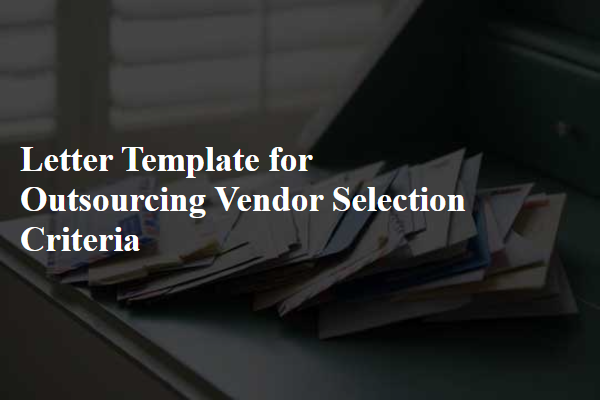
Vendor Expertise and Track Record
Vendor expertise significantly impacts project outcomes. Companies require vendors with a proven track record, particularly in relevant sectors. Key performance metrics, including previous project completion rates and client satisfaction scores, showcase vendor reliability. Additionally, examples of past work, especially similar projects undertaken in the last five years, help evaluate the vendor's capability. Certifications and qualifications of staff members, such as PMP (Project Management Professional) or Six Sigma credentials, further affirm expertise. Vendors should also provide case studies illustrating innovative solutions and adaptability in client scenarios. Industry recognition, such as awards or accreditations from professional associations, adds to a vendor's credibility and trustworthiness.
Quality Assurance and Compliance
Quality assurance (QA) measures are essential for maintaining standards in products or services provided by outsourcing vendors. These QA processes include regular audits, documentation of compliance procedures, and adherence to relevant industry standards, such as ISO 9001, which emphasizes efficiency and customer satisfaction. Compliance refers to adhering to legal regulations and internal policies, crucial for industries like healthcare, finance, and IT, where data security laws like GDPR or HIPAA play a vital role. Selecting vendors with robust QA frameworks and compliance certifications not only mitigates risks but ensures that they meet expected service levels and deliver consistent quality. Evaluating vendors based on their QA methodologies, past compliance records, and commitment to continuous improvement can significantly influence the success of outsourcing partnerships.
Cost-effectiveness and Pricing Structure
Cost-effectiveness serves as a critical factor when evaluating outsourcing vendors, where pricing structures must align with project budgets and anticipated returns on investment. A detailed breakdown of fees, including hourly rates, fixed project costs, and any additional charges for services such as overtime or maintenance, aids in comprehensive financial planning. Vendors showcasing flexibility in their pricing models, such as tiered pricing or volume discounts based on project size or duration, can better accommodate various budget constraints. Additionally, assessing cost transparency, including the clarity of invoices and the absence of hidden fees, can foster trust and facilitate long-term partnerships, ultimately enhancing the project's overall economic viability while ensuring quality service delivery.
Security and Confidentiality Measures
Selecting an outsourcing vendor necessitates a comprehensive assessment of their security and confidentiality measures to protect sensitive data. Vendors must adhere to international standards, such as ISO/IEC 27001, ensuring systematic management of information security. Data encryption protocols should be employed during transmission and at rest, safeguarding sensitive client information from unauthorized access. Regular security audits, vulnerability assessments, and penetration testing should be conducted to identify and mitigate any potential risks. Additionally, compliance with regional regulations, such as the General Data Protection Regulation (GDPR) in Europe or the Health Insurance Portability and Accountability Act (HIPAA) in the United States, is essential to ensure legal adherence regarding data protection. A robust incident response plan should also be in place to address security breaches, minimizing potential damage and ensuring timely notification to affected parties. Vendor personnel should undergo background checks and security training to maintain awareness of best practices in data security and confidentiality.
Communication and Responsiveness
Effective communication and responsiveness are crucial factors when selecting an outsourcing vendor for business partnerships. Timely and clear communication can significantly influence project outcomes, and vendors should demonstrate a structured communication process through established channels, response times within 24 hours for inquiries, and regular updates throughout the project lifecycle. Responsiveness also encompasses the vendor's ability to adapt to changing requirements or urgent issues, showcasing flexibility in prioritizing tasks and addressing feedback. Tools utilized for communication, such as project management software like Asana or Slack, can enhance collaboration and ensure transparency, providing stakeholders with real-time access to project status. Additionally, assessing the vendor's communication style during the initial meetings and their proficiency in your preferred language can indicate their readiness to foster a productive working relationship.
Letter Template For Outsourcing Vendor Selection Criteria Samples
Letter template of vendor selection criteria for outsourcing IT services.
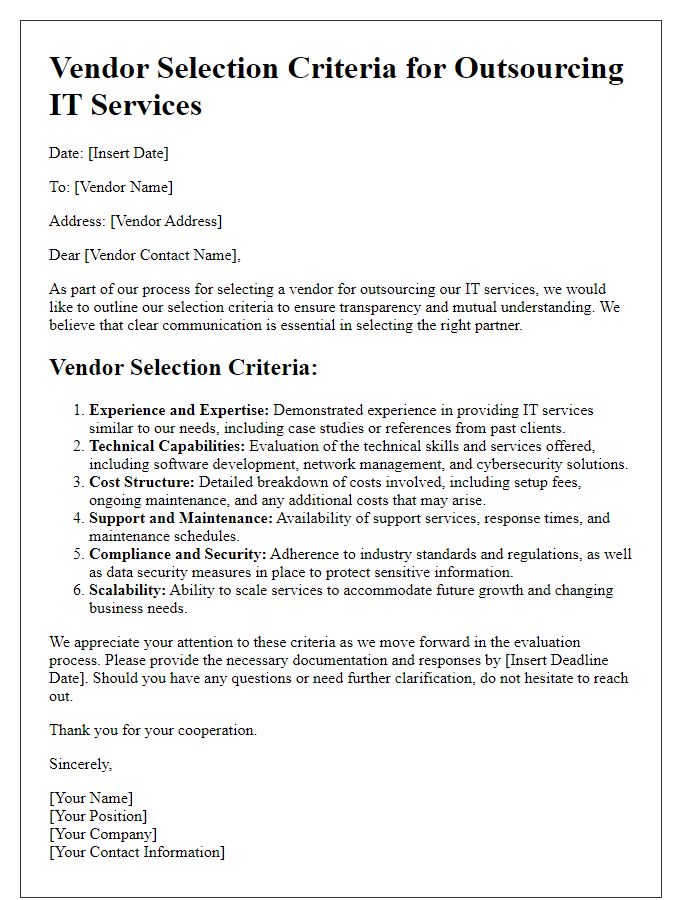
Letter template of vendor evaluation criteria for outsourcing marketing services.
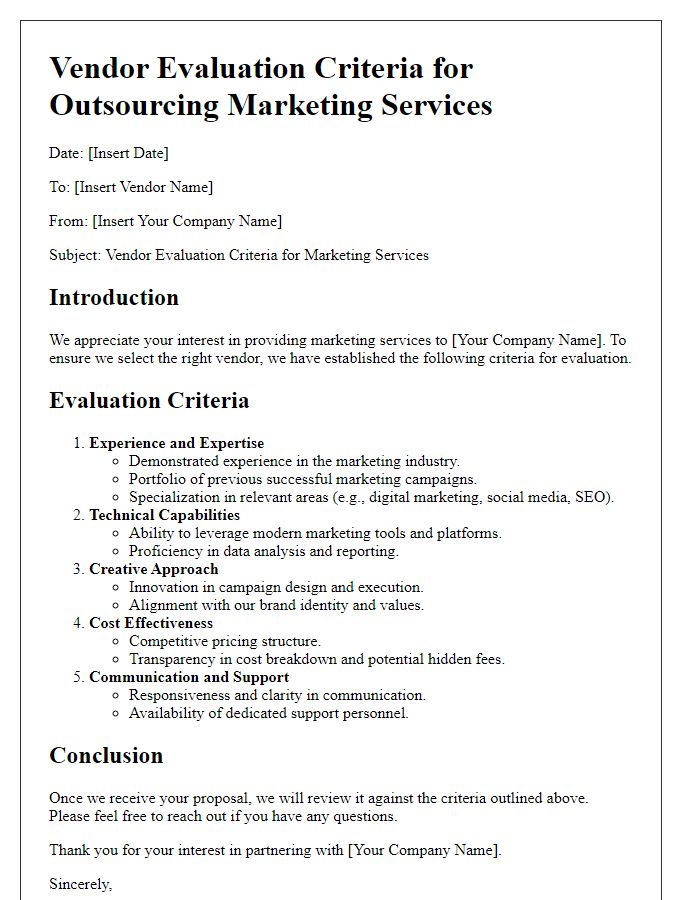
Letter template of outsourcing vendor assessment criteria for logistics.
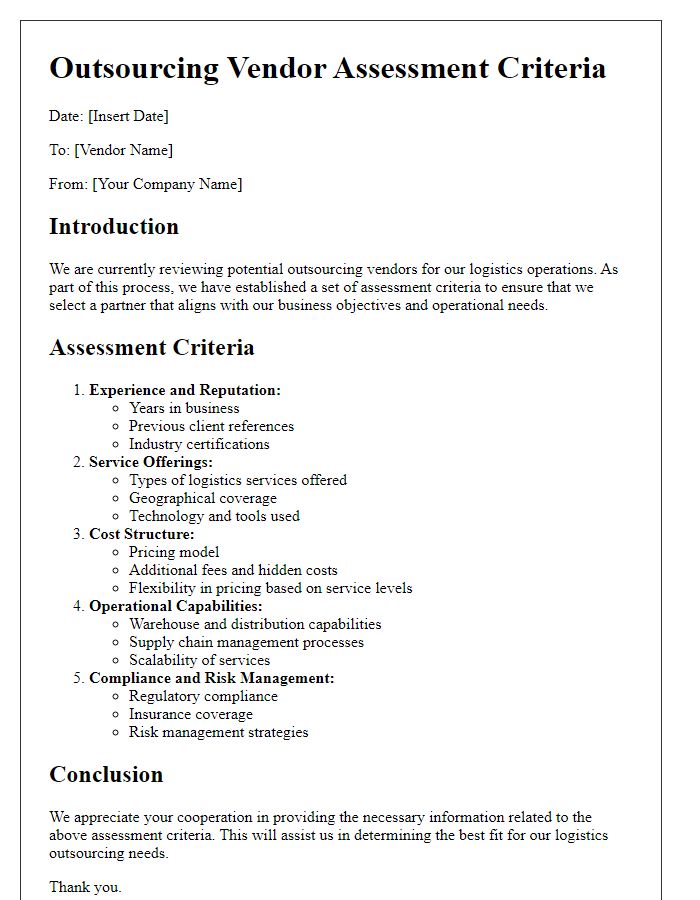
Letter template of outsourcing partner selection criteria for human resources.
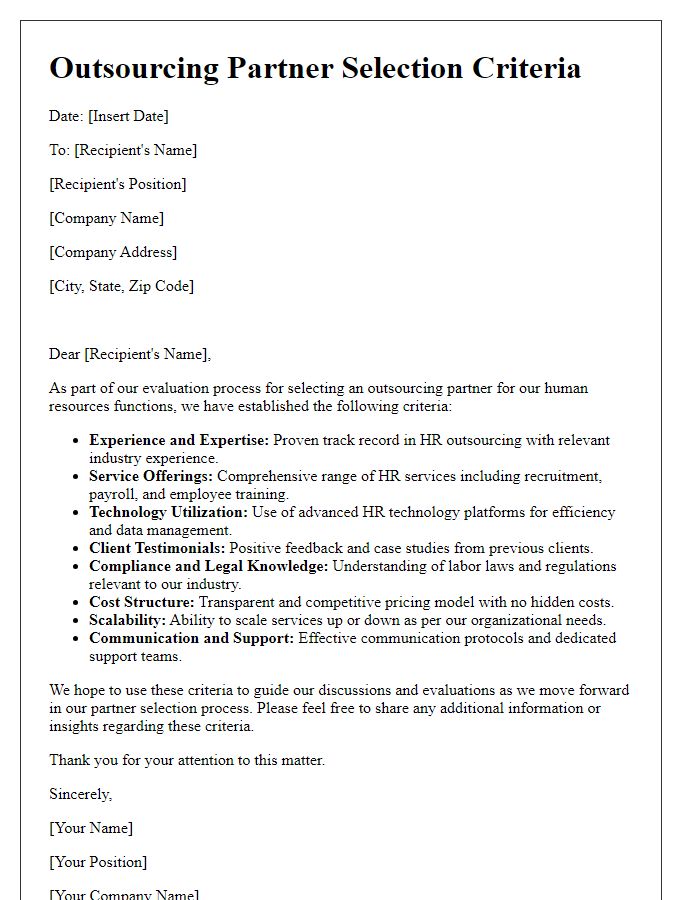
Letter template of criteria for outsourcing vendor engagement in finance.
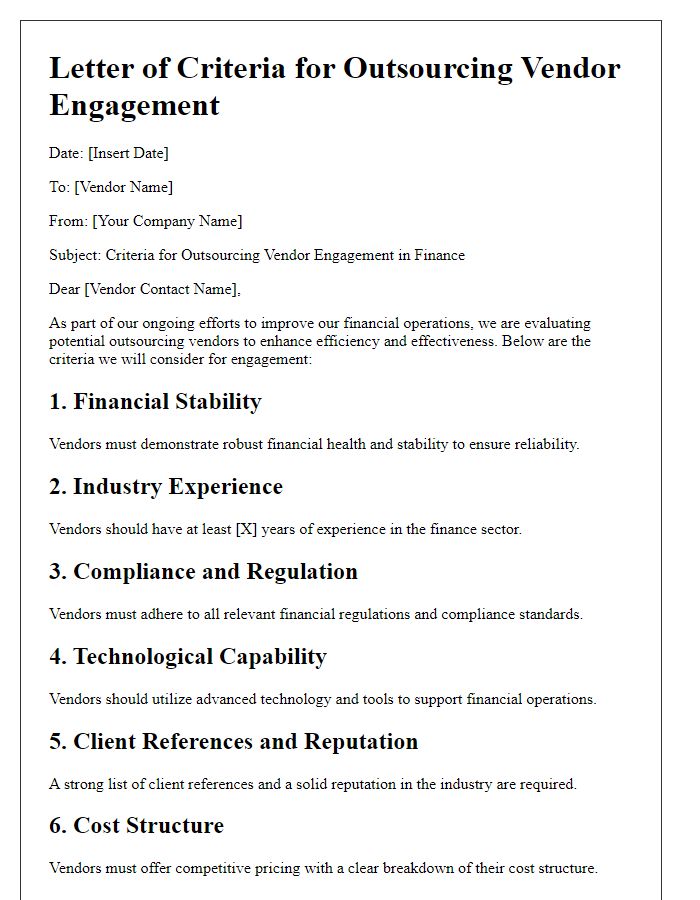
Letter template of evaluation criteria for outsourcing customer service vendors.
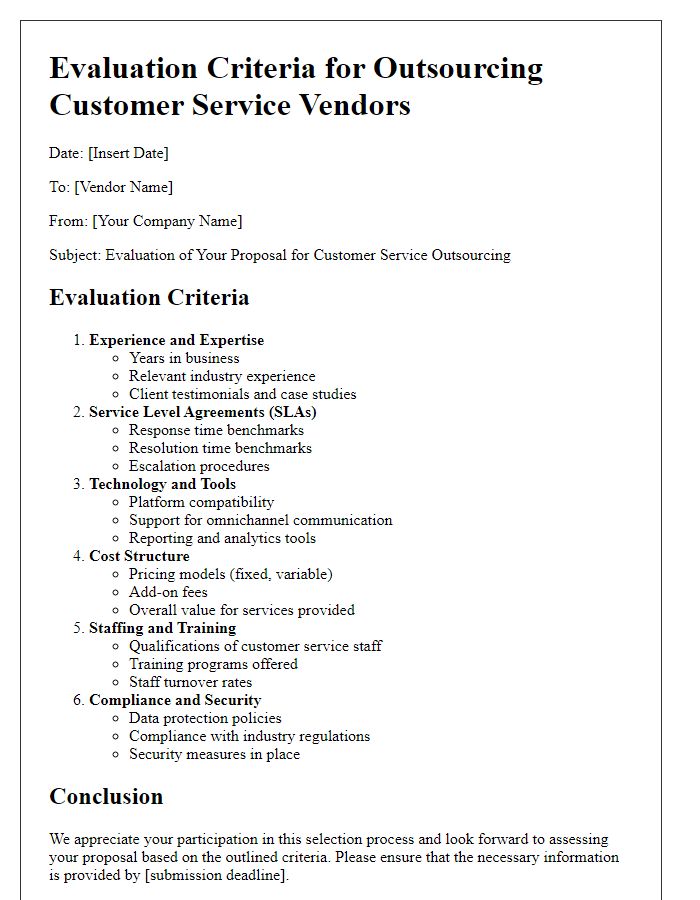
Letter template of outsourcing vendor selection criteria for manufacturing.
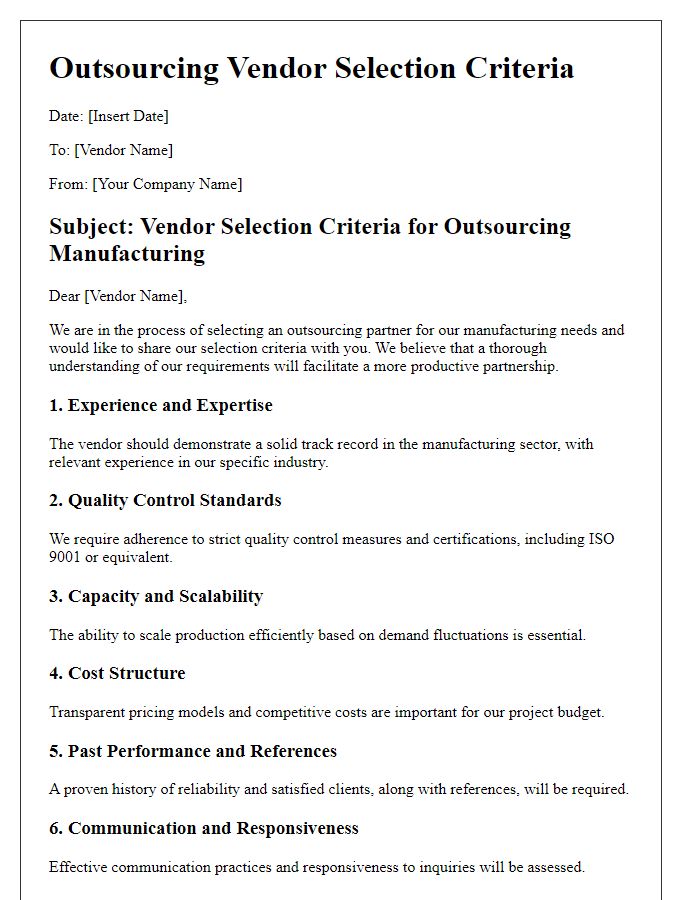
Letter template of criteria for selecting outsourcing vendors in procurement.
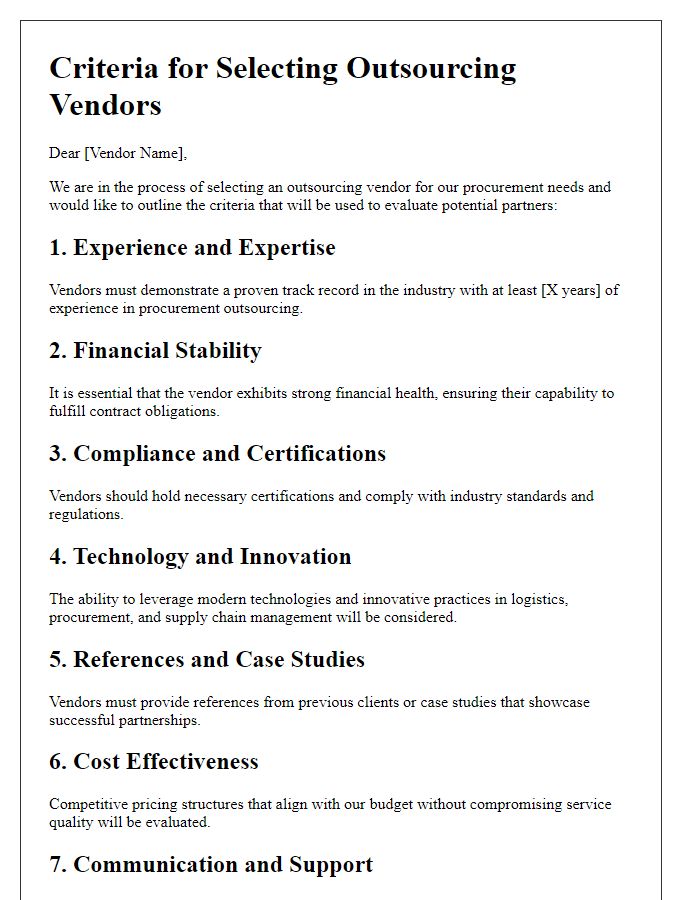
Letter template of outsourcing vendor assessment guidelines for software development.
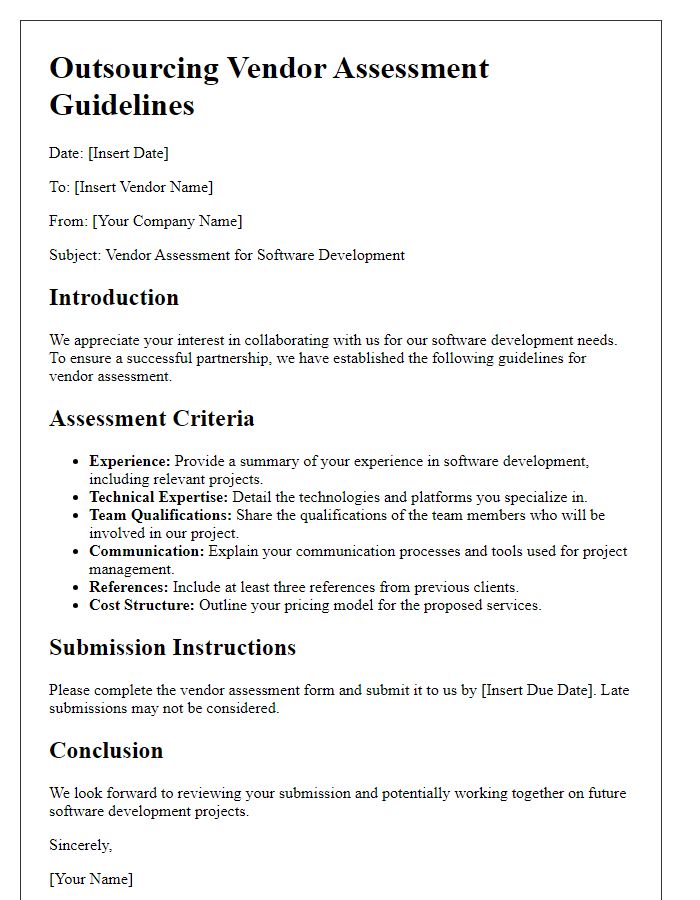

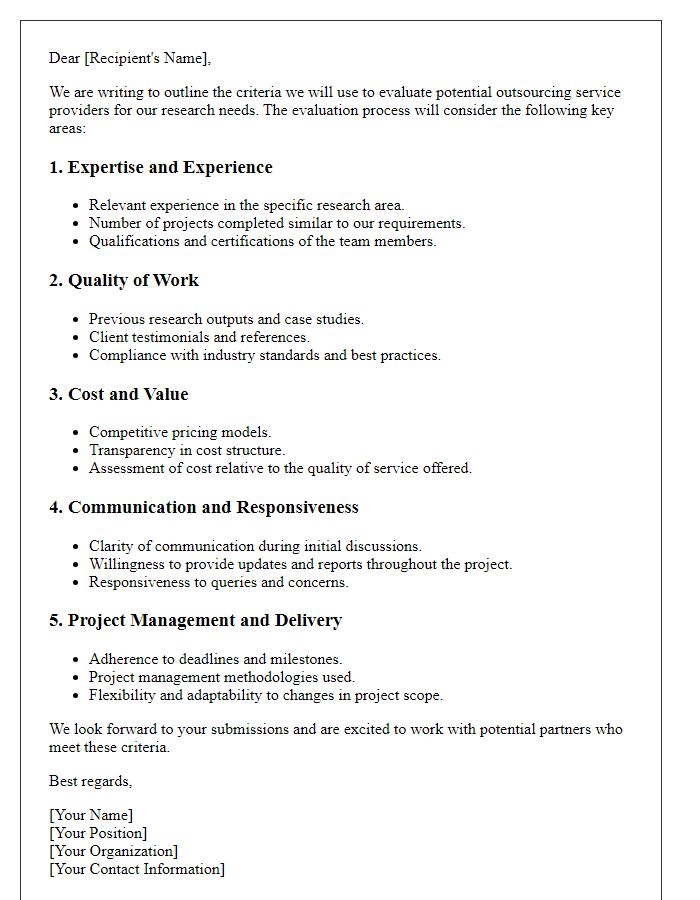


Comments